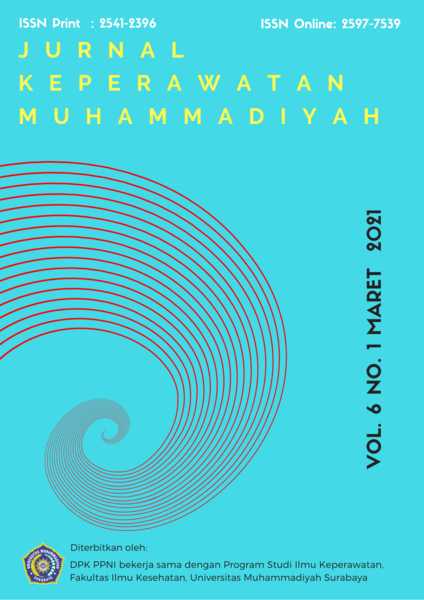Hubungan Tingkat Pendidikan dengan Strategi Koping Warga Binaan Pemasyarakatan di Lapas Kelas II B Brebes
DOI:
https://doi.org/10.30651/jkm.v6i1.7155Keywords:
educational levels, prisoners, coping strategiAbstract
Objective:  The number of prisoners in the world is increasing every year and Indonesia ranks fifth in the world. Correctional institutions in Indonesia are largely overloaded from capacity. This is a stressor for the  prisoners. The educational levels of  prisoners very widely, allowing the use of different coping strategies. The purpose of this study was to analyze the relationship between the level of education and the Coping Strategy of prisoners.
Methods: The research design used was descriptive correlative study. Determination of the sample using purposive sampling to prisoners in Class II B Brebes Correctional institutions. Two instruments were used, namely the demographic data questionnaire and the Brief COPE questionnaire. Analysis of the frequency distribution for the univariate test and the pearson correlation test for bivariate analysis in order to describe the description of the relationship between education level and the coping strategy of  prisoners.
Results: The results showed that the level of education with the dimensions of problem focused coping has a correlation coefficient of 0.226 with a p value = 0.034. The education level variable with emotional focused coping has a correlation coefficient of 0.648 with a p value = 0.000, which means that there is a significant correlation between the  prisoners education level variable with the dimensions of problem focused coping and emotional focused coping.
Conclusion: The conclusion of the study is a significant correlation between the level of education and the coping strategy of prisoners.References
Aji, A. B., & Ambarini, T. K. (2014). Coping Stress Perawat dalam Menghadapi Agresi Pasien di Rumah Sakit Jiwa Dr. Radjiman Wediodiningrat Lawang. Jurnal Psikologi Industri Dan Organisasi, 3(4).
Anggraieni, W. N., & Subandi, S. (2014). Pengaruh terapi relaksasi zikir untuk menurunkan stres pada penderita hipertensi esensial. Jurnal Intervensi Psikologi (JIP), 6(1), 81–102. https://doi.org/10.20885/intervensipsikologi.vol6.iss1.art6
Anggraini, E. (2015). Strategi regulasi emosi dan perilaku koping religius narapidana wanita dalam masa pembinaan. Jurnal Theologia, 26(2), 284–311. Retrieved from http://journal.walisongo.ac.id/index.php/teologia/article/view/435/398
Apriska, R. A. D. (2016). Mekanisme koping pada lansia di unit pelayanan lanjut usia “ Wening Wardoyo †Ungaran. Keperawatan Undip.
Aris, Y., Sarfika, R., & Erwina, I. (2019). Stress Pada Mahasiswa Keperawatan Dan Strategi Koping Yang Digunakan. NERS Jurnal Keperawatan, 14(2), 81. https://doi.org/10.25077/njk.14.2.81-91.2018
Chahal, S., Rana, S., & Singh, P. (2016). Impact of coping on mental health of convicted prisoners, 3(2).
Direktorat Pembinaan Dan Narapidana Kerja Latihan. (2018). Sistem database pemasyarakatan, kanwil & ditjenpas.
Goleman, D. (2001). Emotional Intelegences: Kecerdasan emosional, Mengapa EL lebih penting daripada IQ. Jakarta: PT. Gramedia.
Gurwood, A. S., & Kabat, A. G. (2014). World prison population list, eleventh edition, (November 2014), 1–15.
Hardiyanti, R., & Permana, I. (2019). Straregi Coping Terhadap Stress Kerja Pada Perawat Di Rumah Sakit: Literatur Review. Jurnal Keperawatan Muhammadiyah, 73–81.
Lazarus, R. s. & S. F. (1984). Stress, appraisal, and coping (Vol. 91).
Maschi, T., Viola, D., & Koskinen, L. (2015). Trauma, stress, and coping among older adults in prison: towards a human rights and intergenerational family justice action agenda. Traumatology, 21(3), 188–200. https://doi.org/10.1037/trm0000021
Nursalam. (2013). Metodologi penelitian ilmu keperawatan, pendekatan praktis. Jakarta: Salemba Medika.
Rachmah, E. rizky N., & Rahmawati, T. (2019). Hubungan Pengetahuan Stress Dengan Mekanisme Koping Remaja. Dinamika Kesehatan Jurnal Kebidanan Dan Keperawatan, 10(2), 595–608. https://doi.org/10.33859/dksm.v10i2.517
Rocheleau, A. M. (2014). Prisoners’ coping skills and involvement in serious prison misconduct. Victims and Offenders, 9(2), 149–177. https://doi.org/10.1080/15564886.2013.866916
Rofiah, S. (2015). Hubungan antara Kecerdasan Emosi dengan Strategi Coping pada Caregiver Formal Lansia. Skripsi. Universitas Negeri Semarang.
Tuasikal, A. N. A., & Retnowati, S. (2019). Kematangan Emosi, Problem-Focused Coping, Emotion-Focused Coping dan Kecenderungan Depresi pada Mahasiswa Tahun Pertama. Gadjah Mada Journal of Psychology (GamaJoP), 4(2), 105. https://doi.org/10.22146/gamajop.46356
Yarkin, G. (2013). Coping mechanisms and emotions of the ex-convicts in diyarbakir prison.
Downloads
Published
Issue
Section
License
- Penulis tetap memegang hak atas karyanya dan memberikan hak publikasi pertama kepada jurnal ini yang secara simultan karya tersebut dilisensikan di bawah:Â Creative Commons Attribution-ShareAlike 4.0 International (CC BY-SA 4.0)













